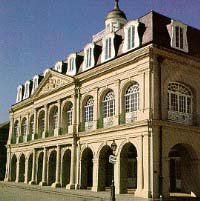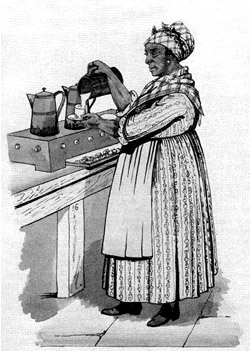Physical Development of Louisiana
Many men and women of African descent contributed to the physical development of Louisiana. Santiago Derom (James Durham), and Rafael Bernabe are two such men. Santiago Derom purchased his freedom for 500 pesos from Doctor Dow of New Orleans. Prior to service with Dow, Santiago had been enslaved by a Scottish doctor in Philadelphia from whom he acquired his medical talents. By 1783, Santiago had purchased his freedom and could speak French, Spanish, and English fluently, and by 1788 he had established a large practice which served blacks and whites and was known as the most distinguished physician in New Orleans at the time. Santiago, or James, is said to be the first African-American physician in the United States.
Rafael Bernabe was a moreno (darker-skinned man of African descent) who gained his freedom from a priest in 1775. Rafael was the carpenter commissioned by philanthropist Don Andres Almonester y Roxas to “craft all the doors, windows, staircases, and other woodwork in the cabildo, completed in 1799 to house the town council.” Rafael was paid 550 pesos initially, but had to “guarantee his work with the value of two houses he owned.”
Women had an impact on the marketplace, retail centers, and various areas within the domestic sphere. Even with the creation of a market place by the cabildo, which taxed those who sold in stalls, free women of color and their influence was steadily felt. These women would gain access to stalls through community and kin-based ties (for example through godparent connections) when money was not readily available to pay the tax on the stalls. Records are replete with instances of women as vendors and their successes.
Free and enslaved women of color were so successful at selling merchandise within the streets, in fact, that there were petitions made to the cabildo to intervene. Businesses like Don Fernando Alsar and Co. petitioned the cabildo claiming that free and enslaved women of color were detracting from their livelihoods. They argued that they had to pay rent for their businesses and try to compete with street vendors, a number of whom were women of color, and this greatly affected their ability to feed their families because these women did not have to pay to sell their merchandise.







